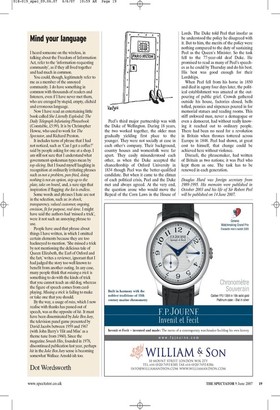Mind your language
I heard someone on the wireless, in talking about the Freedom of Information Act, refer to the 'information-requesting community', as if they all lived together and had much in common.
You could, though, legitimately refer to me as a member of the annoyed community. I do have something in common with thousands of readers and listeners, even if I have never met them, who are enraged by stupid, empty, cliched and erroneous language.
Now I have read an entertaining little book called She Literally Exploded: The Daily Telegraph Infuriating Phrasebook (Constable, £5.99). It is by Christopher Howse, who used to work for The Spectator, and Richard Preston.
It includes turns of phrase that I had not noticed, such as 'Can I get a coffee?' said by people asking for one at a shop. I am still not sure that I understand what government-spokesman types mean by top-slicing. But I found myself laughing in recognition at ordinarily irritating phrases such as not a problem, pan-fried, doing nothing is not an option, step up to the plate, take on board, and, a sure sign that inspiration if flagging: the list is endless.
Some words and phrases I hate are not in the selection, such as: in shock transparency, valued customer; ongoing envision, fit for purpose, real-lime. I might have said the authors had 'missed a trick', were it not such an annoying phrase to use.
People have used that phrase about things I have written, in which I omitted certain elements because they are too hackneyed to mention. 'She missed a trick by not mentioning the delicious tale of Queen Elizabeth, the Earl of Oxford and the fart,' writes a reviewer, ignorant that I had judged the story too well known to benefit from another outing. In any case, many people think that missing a trick is something to do with the kinds of trick that you cannot teach an old dog, whereas the figure of speech comes from cardplaying. Missing a trick is failing to make or take one that you should.
By the way, a usage of miss, which I now realise with thanks has passed out of speech, was as the opposite of hit. It must have been disseminated by Juke Box Jury, the television panel game presented by David Jacobs between 1959 and 1967 (with John Barry's 'Hit and Miss' as a theme tune from 1960). Since the magazine Smash Hits, founded in 1978, discontinued publication last year, perhaps hit in the Juke Box Jury sense is becoming somewhat Wallace Arnold-ish too.
Dot Wordsworth




























































 Previous page
Previous page